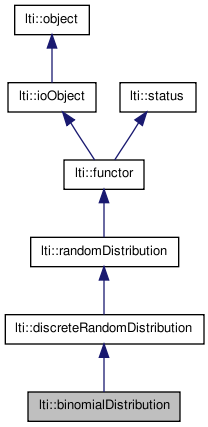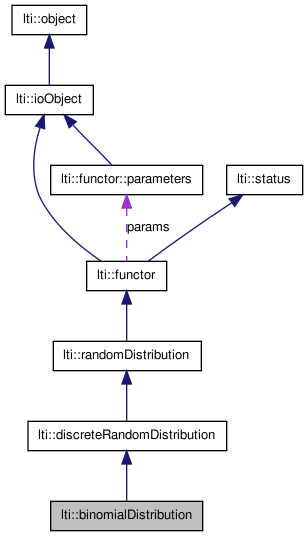

|
latest version v1.9 - last update 10 Apr 2010 |
|
This functor implements the binomial distribution. More...
#include <ltiBinomialDistribution.h>


Classes | |
| class | parameters |
| the parameters for the class binomialDistribution More... | |
Public Member Functions | |
| binomialDistribution () | |
| binomialDistribution (const int &samples) | |
| binomialDistribution (const int &samples, const double &baseProb, const double &conf=0.95) | |
| binomialDistribution (const int &samples, const int &posEvents, const double &conf) | |
| binomialDistribution (const binomialDistribution &other) | |
| virtual | ~binomialDistribution () |
| virtual const char * | getTypeName () const |
| virtual int | draw () const |
| double | pdf (const int &k) const |
| double | pdf (const double &p) const |
| double | pdf (const int &k, const double &p) const |
| double | pdf (const int &k, const double &p, const int &n) const |
| double | cdf (const int &k) const |
| double | cdf (const double &p) const |
| double | cdf (const int &k, const double &p, const int &n) const |
| int | quantile (const double &confProb) const |
| double | upperBound (const int &k) const |
| double | upperBound (const int &k, const int &n) const |
| binomialDistribution & | copy (const binomialDistribution &other) |
| binomialDistribution & | operator= (const binomialDistribution &other) |
| virtual functor * | clone () const |
| const parameters & | getParameters () const |
This functor implements the binomial distribution.
 with
with  the sample size
the sample size  the base probability and
the base probability and  the number of events.
the number of events.
It is also possible to calculate the cumulated probability

Furthermore, the quantile  for a given confidence probability
for a given confidence probability  can be calcultated. With
can be calcultated. With  .
.
Finally, the upper bound for base probability can be estimated with given  ,
,  and
and  , with the confidence probability being one-sided. I.e. the probability
, with the confidence probability being one-sided. I.e. the probability  returned is an approximate solution for
returned is an approximate solution for  .
.
Of the parameters only sampleSize needs to be set for all applications of the functor. The other parameters only need to be set if necessary for the desired use of the functor.
| lti::binomialDistribution::binomialDistribution | ( | ) |
default constructor
| lti::binomialDistribution::binomialDistribution | ( | const int & | samples | ) |
constructor.
Sets the number of samples
| samples | the number of samples |
| lti::binomialDistribution::binomialDistribution | ( | const int & | samples, | |
| const double & | baseProb, | |||
| const double & | conf = 0.95 | |||
| ) |
constructor.
Set the number of samples and the base probability. Optionally, the confidence probabilty can be set for calculating the quantile.
| samples | the number of samples | |
| baseProb | base probability | |
| conf | confidence probability |
| lti::binomialDistribution::binomialDistribution | ( | const int & | samples, | |
| const int & | posEvents, | |||
| const double & | conf | |||
| ) |
constructor used for calculating the upperBound().
| samples | the number of samples | |
| posEvents | number of positiv events | |
| conf | confidence probability |
| lti::binomialDistribution::binomialDistribution | ( | const binomialDistribution & | other | ) |
copy constructor
| other | the object to be copied |
| virtual lti::binomialDistribution::~binomialDistribution | ( | ) | [virtual] |
destructor
| double lti::binomialDistribution::cdf | ( | const int & | k, | |
| const double & | p, | |||
| const int & | n | |||
| ) | const |
Returns the cumulated probability for greater equal k events, base probability p, and sample size n.
If k is out of bounds, zero is returned. If p is out of bounds it is truncated to 0 or 1.
| k | max number of positive events | |
| p | base probability of an event | |
| n | number of samples |
| double lti::binomialDistribution::cdf | ( | const double & | p | ) | const |
Returns the cumulated probability for greater equal k events as set in the parameters.
The base probability in the argument is used. If p is out of bounds it is truncated to 0 or 1.
| p | base probability of an event |
| double lti::binomialDistribution::cdf | ( | const int & | k | ) | const |
Returns the cumulated probability for greater equal k events with the given parameters.
If k is out of bounds, zero is returned.
| k | max number of positive events |
| virtual functor* lti::binomialDistribution::clone | ( | ) | const [virtual] |
returns a pointer to a clone of this functor.
Implements lti::discreteRandomDistribution.
| binomialDistribution& lti::binomialDistribution::copy | ( | const binomialDistribution & | other | ) |
copy data of "other" functor.
| other | the functor to be copied |
Reimplemented from lti::discreteRandomDistribution.
| virtual int lti::binomialDistribution::draw | ( | ) | const [virtual] |
Returns a binomial random number, i.e.
zero or one. 1 is returned if the event occurs, 0 if it doesn't.
Implements lti::discreteRandomDistribution.
| const parameters& lti::binomialDistribution::getParameters | ( | ) | const |
returns used parameters
Reimplemented from lti::functor.
| virtual const char* lti::binomialDistribution::getTypeName | ( | ) | const [virtual] |
returns the name of this type ("binomialDistribution")
Reimplemented from lti::discreteRandomDistribution.
| binomialDistribution& lti::binomialDistribution::operator= | ( | const binomialDistribution & | other | ) |
| double lti::binomialDistribution::pdf | ( | const int & | k, | |
| const double & | p, | |||
| const int & | n | |||
| ) | const |
Returns the probability for k events, base probability p and number of samples n If p is out of bounds zero is returned.
If k is out of bounds, zero is returned.
| k | number of positive events | |
| p | base probability of an event | |
| n | number of samples |
| double lti::binomialDistribution::pdf | ( | const int & | k, | |
| const double & | p | |||
| ) | const |
Returns the probability for k events and base probability p with the given parameters.
If p is out of bounds zero is returned. If k is out of bounds, zero is returned.
| k | number of positive events | |
| p | base probability of an event |
| double lti::binomialDistribution::pdf | ( | const double & | p | ) | const |
Returns the probability for base probability p with the given parameters.
If p is out of bounds zero is returned.
| p | base probability of an event |
| double lti::binomialDistribution::pdf | ( | const int & | k | ) | const |
Returns the probability for exactly k events with the given parameters.
If k is out of bounds, zero is returned.
| k | number of positive events |
| int lti::binomialDistribution::quantile | ( | const double & | confProb | ) | const |
Returns the quantile for a given confidence probability.
For the number of samples and the base probability, the parameters are used.
| confProb | confidence |
| double lti::binomialDistribution::upperBound | ( | const int & | k, | |
| const int & | n | |||
| ) | const |
Returns an approximated upper bound for the base probability of an event given the number of events and the number of samples.
The confidence probability is taken from the parameters. If no solution can be found, a value greater than one is returned.
| k | number of positive events | |
| n | number of samples |
| double lti::binomialDistribution::upperBound | ( | const int & | k | ) | const |
Returns an approximated upper bound for the base probability of an event given the number of events.
The number of samples and the confidence probability are taken from the parameters. If no solution can be found, a value greater than one is returned.
| k | number of positive events |